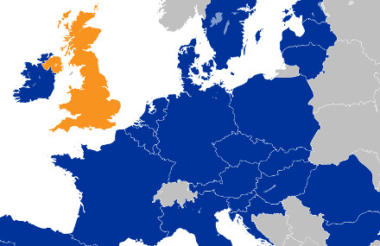Charities were hugely in favour of remaining in the European Union, and will face mostly negative results because of the decision to leave, says David Ainsworth.
Like many people working in the charity sector, I woke up this morning to the decision to leave the European Union, and found myself astonished that the British people had actually gone through with it.
The debate throws up a number of issues for the sector, both ideological and practical.
In terms of ideology, the charity sector finds itself in the slightly awkward position of being – not for the first time over the past couple of years – out of step with its donors, and perhaps its beneficiaries, too.
The charity sector has appeared, over the course on this debate, to be hugely pro-Europe. Perhaps this is because European funding is beneficial to the sector. Personally, though, I feel it is down to the fact that the Leave campaign has been fuelled by an opposition to immigration, and most people who choose to work for a charity share a fundamental belief that we should live in an inclusive society, in which nationality is simply not viewed as an issue of major importance.
The vote overall was very close, but that masks stark regional differences. In England, outside of the London bubble, it was a landslide. So the sector is, on this issue at least, wildly out of step with the people. Charities have to ask themselves the extent to which they need to reflect the views of the English, and the extent to which they should campaign to change them.
That said, there are also very real practical consequences of the vote to leave, most of them not good for charities either.
Funding
The charity sector receives over £200m a year in grants from the European Union, and it seems unlikely that the UK government – free of an obligation to distribute this money – will continue to hand out this money. Given the lack of enthusiasm in government for grant funding – the minister for civil society himself suggested that grants were “unsustainable” – this money is unlikely to be replaced.
Although it was some of the worst, most bureaucratic, difficult-to-access grant funding ever seen by man, charities would probably have preferred to keep it.
But a potentially more problematic issue for the sector is the impact of the vote on grant funding from within charity. Each year, charitable foundations make grants of about £2.5bn to the sector – as well as considerably more outside it – and the vast majority of this relies on income from £123bn of investment assets.
At least, it was £123bn yesterday. The charity sector holds about half its assets in the UK stock market, and has therefore probably lost about £5bn since six o’clock this morning.
A significant chunk of the money distributed by grant-givers comes from capital appreciation – the fact that shares go up in value faster than the economy as a whole. Unless there is a recovery over the next few months, there will be no capital appreciation to speak of this year, and grant-giving could be heavily affected.
Relationship with government
It’s probably fair to say that the sector’s relationship with government is as bad as it’s been for a long time. David Cameron, remarkably, was much more supportive than his party, and may conceivably have had some moderating influence on the negative rhetoric towards campaigning. Certainly after a Leave win, it looks likely that the Conservatives will swing to the right.
But then, it also appears likely that there may be another general election before much longer, so the possibility of a completely different government is on the horizon.
Spending
The charity sector buys a huge amount of foreign currency, and spends a significant percentage of its money abroad. The value of the pound against the dollar, therefore, is a major issue. With this exchange rate currently at the worst level for thirty years, charities’ costs are going up.
On the plus side...
There are a couple of good points to leaving the EU. At least in theory. Whether they pan out in practice is very debateable.
One is that government will no longer be able to blame the EU for its failure to do things. EU regulations will no longer will be a convenient catch-all excuse for terrible contracting, or for a myriad of other lazy decisions by central and local government alike. However there are a couple of potential upsides. Whether they happen is very open to debate, but at least it reopens that debate.
Tax
One of the most pernicious and difficult areas of finance for charities is value added tax. Every time you run a marathon for charity, the last mile is VAT. So there is one possible upside. If we can remove some of this £1.3bn a year cost, the decision to leave the EU will have achieved some good.
Legislation
The charity sector is affected by a huge amount of EU legislation – not least the forthcoming rules requiring charities to obtain “unambiguous consent” before contacting donors. The untangling of these rules could potentially leave charities in a better position when it comes to communicating with supporters. Or more plausibly, it will allow charities to introduce opt-in rules more slowly, at their own pace.
Related articles












